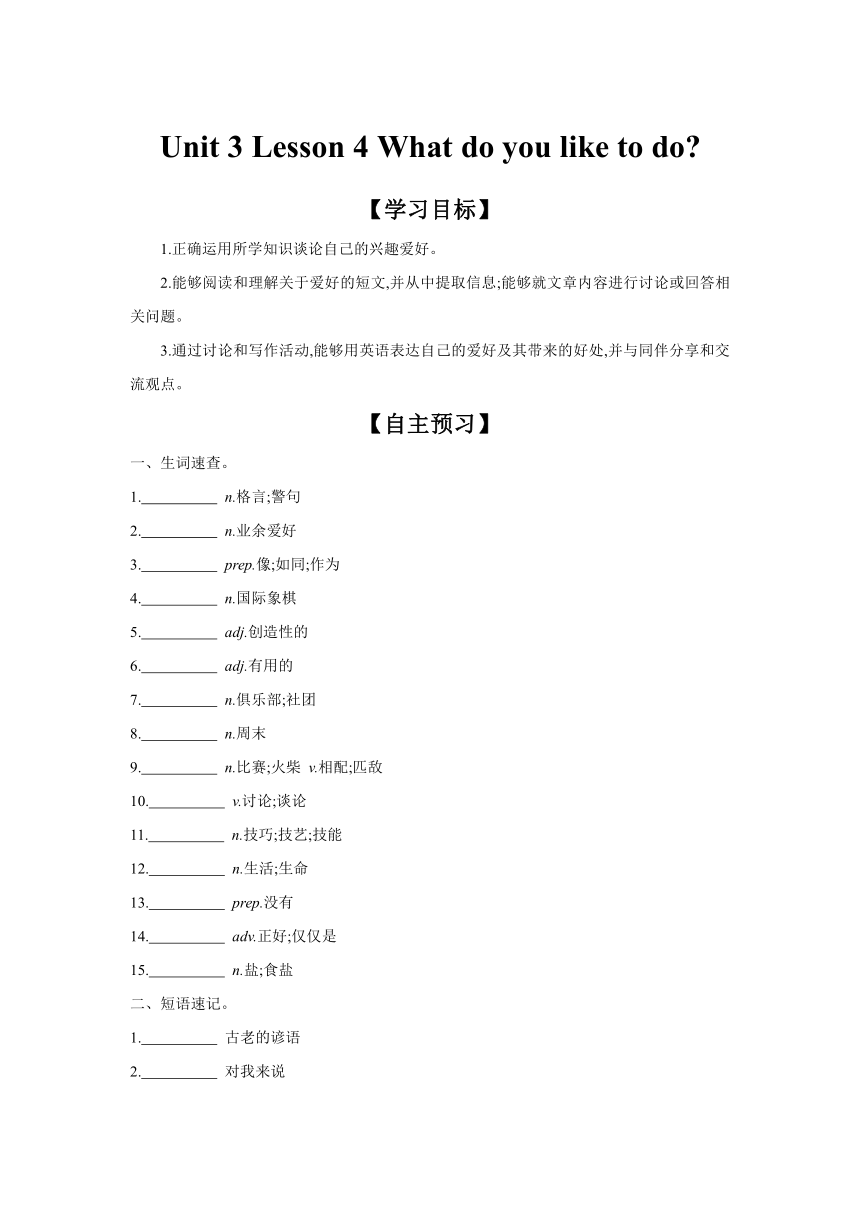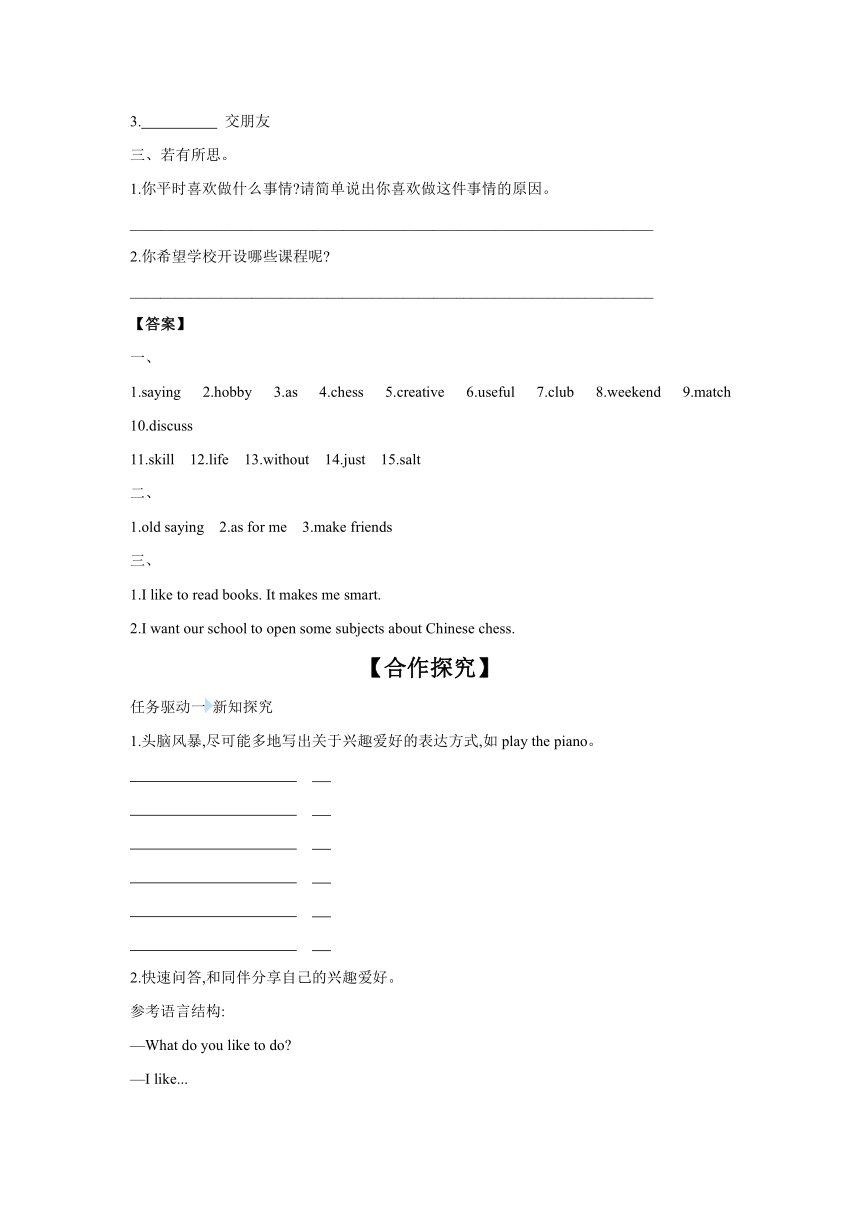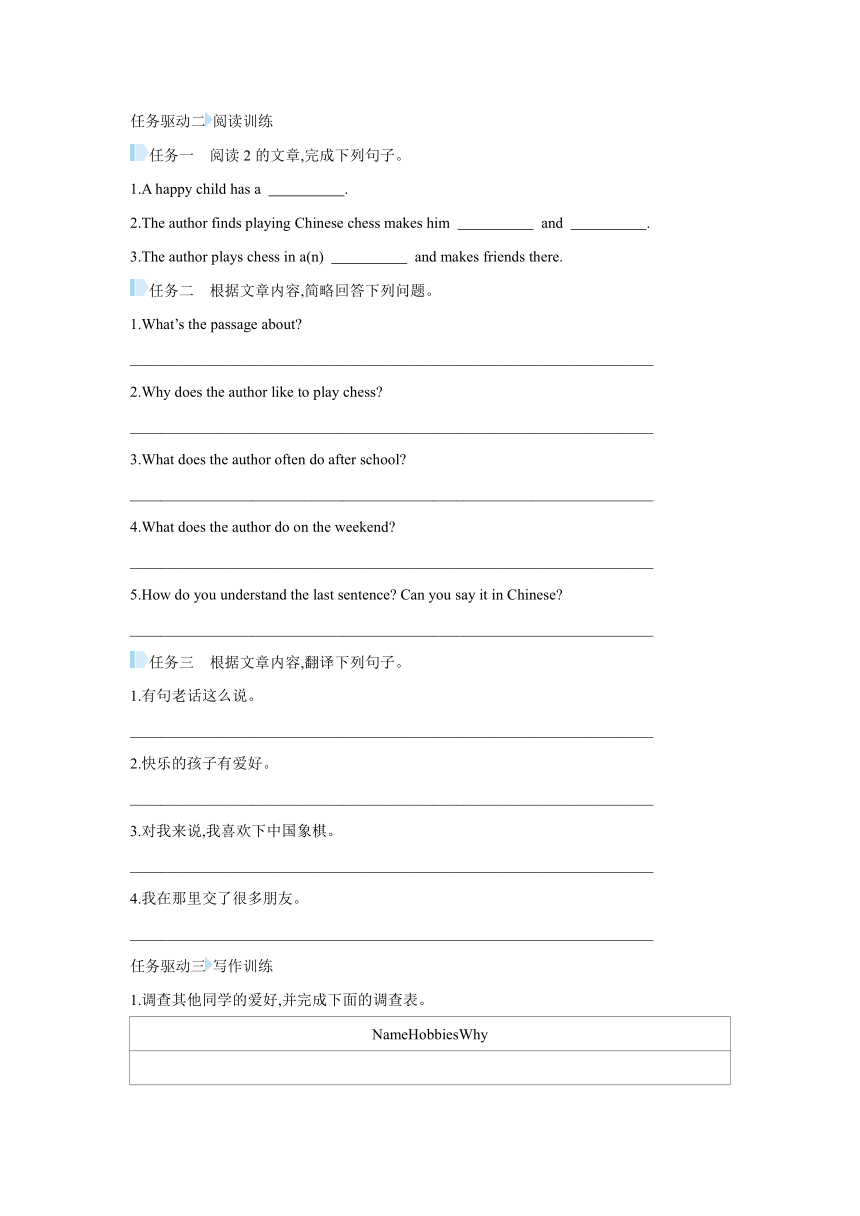【学习任务单】Unit 3 Lesson 4 What do you like to do (含答案) 2024-2025学年英语冀教版七年级上册
文档属性
| 名称 | 【学习任务单】Unit 3 Lesson 4 What do you like to do (含答案) 2024-2025学年英语冀教版七年级上册 |

|
|
| 格式 | docx | ||
| 文件大小 | 27.6KB | ||
| 资源类型 | 教案 | ||
| 版本资源 | 冀教版 | ||
| 科目 | 英语 | ||
| 更新时间 | 2024-12-26 00:00:00 | ||
图片预览



文档简介
Unit 3 Lesson 4 What do you like to do
【学习目标】
1.正确运用所学知识谈论自己的兴趣爱好。
2.能够阅读和理解关于爱好的短文,并从中提取信息;能够就文章内容进行讨论或回答相关问题。
3.通过讨论和写作活动,能够用英语表达自己的爱好及其带来的好处,并与同伴分享和交流观点。
【自主预习】
一、生词速查。
1. n.格言;警句
2. n.业余爱好
3. prep.像;如同;作为
4. n.国际象棋
5. adj.创造性的
6. adj.有用的
7. n.俱乐部;社团
8. n.周末
9. n.比赛;火柴 v.相配;匹敌
10. v.讨论;谈论
11. n.技巧;技艺;技能
12. n.生活;生命
13. prep.没有
14. adv.正好;仅仅是
15. n.盐;食盐
二、短语速记。
1. 古老的谚语
2. 对我来说
3. 交朋友
三、若有所思。
1.你平时喜欢做什么事情 请简单说出你喜欢做这件事情的原因。
_____________________________________________________________________
2.你希望学校开设哪些课程呢
_____________________________________________________________________
【答案】
一、
1.saying 2.hobby 3.as 4.chess 5.creative 6.useful 7.club 8.weekend 9.match 10.discuss
11.skill 12.life 13.without 14.just 15.salt
二、
1.old saying 2.as for me 3.make friends
三、
1.I like to read books. It makes me smart.
2.I want our school to open some subjects about Chinese chess.
【合作探究】
任务驱动一新知探究
1.头脑风暴,尽可能多地写出关于兴趣爱好的表达方式,如play the piano。
2.快速问答,和同伴分享自己的兴趣爱好。
参考语言结构:
—What do you like to do
—I like...
任务驱动二阅读训练
任务一 阅读2的文章,完成下列句子。
1.A happy child has a .
2.The author finds playing Chinese chess makes him and .
3.The author plays chess in a(n) and makes friends there.
任务二 根据文章内容,简略回答下列问题。
1.What’s the passage about
_____________________________________________________________________
2.Why does the author like to play chess
_____________________________________________________________________
3.What does the author often do after school
_____________________________________________________________________
4.What does the author do on the weekend
_____________________________________________________________________
5.How do you understand the last sentence Can you say it in Chinese
_____________________________________________________________________
任务三 根据文章内容,翻译下列句子。
1.有句老话这么说。
_____________________________________________________________________
2.快乐的孩子有爱好。
_____________________________________________________________________
3.对我来说,我喜欢下中国象棋。
_____________________________________________________________________
4.我在那里交了很多朋友。
_____________________________________________________________________
任务驱动三写作训练
1.调查其他同学的爱好,并完成下面的调查表。
NameHobbiesWhy
参考语言结构:
—What’s your hobby
—I like to...
—What good does it do to you
—It makes me...
2.句式训练
根据上面调查表中的内容,写几个句子,说明其他同学的爱好及其带来的好处。例如:
Zhao Ming likes to play basketball. It makes him strong and healthy.
Li Lan likes to read books because it makes her relaxed.
_____________________________________________________________________
_____________________________________________________________________
_____________________________________________________________________
_____________________________________________________________________
_____________________________________________________________________
3.写作训练
写一篇短文,介绍其他同学的爱好及其带来的好处。
You may begin like this:
My classmates have different hobbies.
_____________________________________________________________________
_____________________________________________________________________
_____________________________________________________________________
_____________________________________________________________________
_____________________________________________________________________
·学法指导·
在写作时加入一些谚语可以丰富文章的表达方式,让内容更加引人注目,增加文章的深度和文采。
【答案】
任务驱动二
任务一
1.hobby
2.creative happy
3.club
任务二
1.A hobby.
2.Because it makes the author creative and happy.
3.The author often plays chess in a club.
4.The author likes to watch Chinese chess matches with his grandfather.
5.A hobby is very important in our life.
生活中没有爱好就像食物没有盐。
任务三
1.There is an old saying.
2.A happy child has a hobby.
3.As for me, I like to play Chinese chess.
4.I make many friends there.
【知识超市】
Different people have different hobbies. 不同的人有不同的爱好。
用法总结 1.different是一个形容词,意为“不同的”。它用来描述两个或多个事物之间在性质、特征或状态上的区别,后面跟可数名词的复数形式。
2.当用“some”“a lot of”“lots of”或大于1的数词时,可数名词通常用复数形式。例如:
There are some oranges on the desk.桌子上有一些橘子。
I have many books in my schoolbag.我书包里有很多书。
素养训练 用括号内所给单词的正确形式填空。
1.There are a lot of (people) at the party.
2.There are twelve (egg) in the fridge.
3.The twins are in different (class).
【答案】
1.people 2.eggs 3.classes
... I often play chess in a club. ……我经常在一个俱乐部下棋。
用法总结 1.play与体育、棋类词语连用时,后面不加定冠词the。例如:
play basketball play chess
2.play与乐器类词语连用时,后面要加定冠词the。例如:
play the guitar play the piano
play the drums play the violin
素养训练 在空格中填入适当的冠词,如果不用填就用“/”表示。
1.Bob can play basketball but he can’t play violin.
2.His brother plays piano every day.
【答案】
1./ the 2.the
【学习目标】
1.正确运用所学知识谈论自己的兴趣爱好。
2.能够阅读和理解关于爱好的短文,并从中提取信息;能够就文章内容进行讨论或回答相关问题。
3.通过讨论和写作活动,能够用英语表达自己的爱好及其带来的好处,并与同伴分享和交流观点。
【自主预习】
一、生词速查。
1. n.格言;警句
2. n.业余爱好
3. prep.像;如同;作为
4. n.国际象棋
5. adj.创造性的
6. adj.有用的
7. n.俱乐部;社团
8. n.周末
9. n.比赛;火柴 v.相配;匹敌
10. v.讨论;谈论
11. n.技巧;技艺;技能
12. n.生活;生命
13. prep.没有
14. adv.正好;仅仅是
15. n.盐;食盐
二、短语速记。
1. 古老的谚语
2. 对我来说
3. 交朋友
三、若有所思。
1.你平时喜欢做什么事情 请简单说出你喜欢做这件事情的原因。
_____________________________________________________________________
2.你希望学校开设哪些课程呢
_____________________________________________________________________
【答案】
一、
1.saying 2.hobby 3.as 4.chess 5.creative 6.useful 7.club 8.weekend 9.match 10.discuss
11.skill 12.life 13.without 14.just 15.salt
二、
1.old saying 2.as for me 3.make friends
三、
1.I like to read books. It makes me smart.
2.I want our school to open some subjects about Chinese chess.
【合作探究】
任务驱动一新知探究
1.头脑风暴,尽可能多地写出关于兴趣爱好的表达方式,如play the piano。
2.快速问答,和同伴分享自己的兴趣爱好。
参考语言结构:
—What do you like to do
—I like...
任务驱动二阅读训练
任务一 阅读2的文章,完成下列句子。
1.A happy child has a .
2.The author finds playing Chinese chess makes him and .
3.The author plays chess in a(n) and makes friends there.
任务二 根据文章内容,简略回答下列问题。
1.What’s the passage about
_____________________________________________________________________
2.Why does the author like to play chess
_____________________________________________________________________
3.What does the author often do after school
_____________________________________________________________________
4.What does the author do on the weekend
_____________________________________________________________________
5.How do you understand the last sentence Can you say it in Chinese
_____________________________________________________________________
任务三 根据文章内容,翻译下列句子。
1.有句老话这么说。
_____________________________________________________________________
2.快乐的孩子有爱好。
_____________________________________________________________________
3.对我来说,我喜欢下中国象棋。
_____________________________________________________________________
4.我在那里交了很多朋友。
_____________________________________________________________________
任务驱动三写作训练
1.调查其他同学的爱好,并完成下面的调查表。
NameHobbiesWhy
参考语言结构:
—What’s your hobby
—I like to...
—What good does it do to you
—It makes me...
2.句式训练
根据上面调查表中的内容,写几个句子,说明其他同学的爱好及其带来的好处。例如:
Zhao Ming likes to play basketball. It makes him strong and healthy.
Li Lan likes to read books because it makes her relaxed.
_____________________________________________________________________
_____________________________________________________________________
_____________________________________________________________________
_____________________________________________________________________
_____________________________________________________________________
3.写作训练
写一篇短文,介绍其他同学的爱好及其带来的好处。
You may begin like this:
My classmates have different hobbies.
_____________________________________________________________________
_____________________________________________________________________
_____________________________________________________________________
_____________________________________________________________________
_____________________________________________________________________
·学法指导·
在写作时加入一些谚语可以丰富文章的表达方式,让内容更加引人注目,增加文章的深度和文采。
【答案】
任务驱动二
任务一
1.hobby
2.creative happy
3.club
任务二
1.A hobby.
2.Because it makes the author creative and happy.
3.The author often plays chess in a club.
4.The author likes to watch Chinese chess matches with his grandfather.
5.A hobby is very important in our life.
生活中没有爱好就像食物没有盐。
任务三
1.There is an old saying.
2.A happy child has a hobby.
3.As for me, I like to play Chinese chess.
4.I make many friends there.
【知识超市】
Different people have different hobbies. 不同的人有不同的爱好。
用法总结 1.different是一个形容词,意为“不同的”。它用来描述两个或多个事物之间在性质、特征或状态上的区别,后面跟可数名词的复数形式。
2.当用“some”“a lot of”“lots of”或大于1的数词时,可数名词通常用复数形式。例如:
There are some oranges on the desk.桌子上有一些橘子。
I have many books in my schoolbag.我书包里有很多书。
素养训练 用括号内所给单词的正确形式填空。
1.There are a lot of (people) at the party.
2.There are twelve (egg) in the fridge.
3.The twins are in different (class).
【答案】
1.people 2.eggs 3.classes
... I often play chess in a club. ……我经常在一个俱乐部下棋。
用法总结 1.play与体育、棋类词语连用时,后面不加定冠词the。例如:
play basketball play chess
2.play与乐器类词语连用时,后面要加定冠词the。例如:
play the guitar play the piano
play the drums play the violin
素养训练 在空格中填入适当的冠词,如果不用填就用“/”表示。
1.Bob can play basketball but he can’t play violin.
2.His brother plays piano every day.
【答案】
1./ the 2.the
同课章节目录
